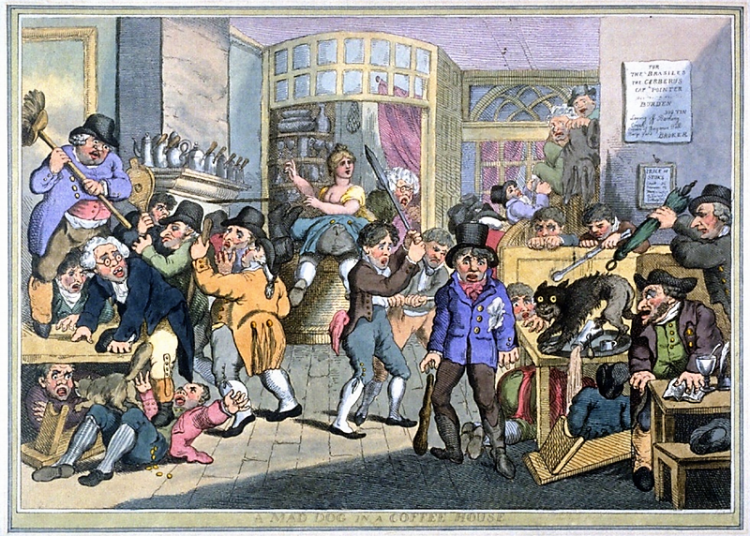
A Mad Dog in a Coffee House (London, 20th March 1809)
by the English caricaturist Thomas Rowlandson (1756-1827)
The term hair of the dog denotes an alcoholic drink taken to cure a hangover.
It is a shortening of the phrase hair of the dog that bit you, first recorded in A dialogue conteinyng the nomber in effect of all the prouerbes in the englishe tongue compacte in a matter concernyng two maner of mariages (London, 1546), by the English playwright and epigrammatist John Heywood (circa 1496-circa 1578):
I praie the leat me and my felowe haue
A heare of the dog that bote vs last nyght.
And bytten were we both to the brayne¹ aryght,
We sawe eche other drunke in the good ale glas.
in contemporary English:
I pray thee let me and my fellow have
A hair of the dog that bit us last night.
And bitten were we both to the brain¹ aright.
We saw each other drunk in the good ale glass.
(¹ bitten to the brain: drunk)
This phrase originally referred to a remedy formerly recommended as a cure for the bite of a rabid dog. The Roman statesman and scholar Pliny the Elder (23-79) described several of these remedies in his encyclopaedia of the natural and human worlds, The Natural History (Naturalis Historia – 77):
(translation: John Bostock & H.T. Riley – London, 1855)
When a person has been bitten by a mad dog, he may be preserved from hydrophobia by applying the ashes of a dog’s head to the wound. All ashes of this description, we may here remark once for all, are prepared in the same method; the substance being placed in a new earthen vessel well covered with potter’s clay, and put into a furnace. These ashes, too, are very good, taken in drink, and hence some recommend the head itself to be eaten in such cases. Others, again, attach to the body of the patient a maggot, taken from the carcase of a dead dog; or else place the menstrual blood of a bitch, in a linen cloth, beneath his cup, or insert in the wound ashes of hairs from the tail of the dog that inflicted the bite.
This belief was in accordance with similia similibus curantur, likes are cured by likes, which is also the basis of homeopathy. The Greek comic poet Antiphanes (circa 408-circa 334 BC) played with this idea (his text also shows that an alcoholic drink taken to cure a hangover is far from being a recent practice…):
(from The Fragments of Attic Comedy, edited by John Maxwell Edmonds – Leiden, 1959)
To drive out like with like, you know, is what we all require,
Bugle with bugle, wine with wine, a bawler with a crier,
Fatigue with tiredness, noise with noise, a whore with half-a-tanner,
Pride with itself, Callistratus² with a chef, and in like manner
Faction with faction, fight with fight, lis lite³, toils with labours,
A pugilist with two black eyes, your own wife with your neighbour’s.
(² The orator and statesman Callistratus avoided being put to death for the loss of Oropus to Thebes by going into exile; the “chef” may have been a witness suborned by the prosecution.)
(³ lis lite: lawsuit with lawsuit; the Latin noun lis/lit- is the root of English words such as litigious and litigation.)
The equivalent French phrase, reprendre du poil de la bête, literally, to take again some hair of the beast, was recorded in the first edition (1694) of the Dictionnaire de L’Académie française:
On dit fig. & prov. qu’Il faut reprendre du poil de la beste, pour dire, qu’en Certaines indispositions, en certaines incommoditez il faut refaire les mesmes choses qui les ont causees. Vous estes fatigué pour avoir joué à la paulme, pour avoir trop couru à la chasse, il faut recommencer, il faut reprendre du poil de la beste.
translation:
It is figuratively and proverbially said that one needs to take again some hair of the beast to say, that in certain indispositions, in certain incommodities one needs to do again the same things that have caused them. You are tired for having played real tennis, for having run too much while hunting, you need to start again, you need to take again some hair of the beast.
The French phrase had appeared in a different form in A Dictionarie of the French and English Tongues (1611), by Randle Cotgrave:
Prendre du poil de la beste. To take a remedie for a mischiefe from that which was the cause thereof; as to go thin clothed when a cold is taken; or in drunkennes to fall a quaffing, thereby to recouer health, or sobrietie; neere vnto which sence our Ale-knights often vse this phrase, and say, Giue vs a haire of the dog that last bit vs.
However, the signification of this phrase has changed in the course of time; the eighth edition (1932-35) of the Dictionnaire de L’Académie française defines it as meaning:
se ressaisir, reprendre le dessus
to regain one’s self-control, to get over it.
